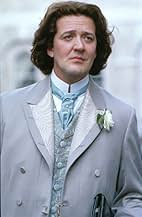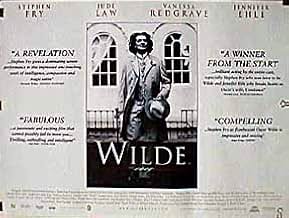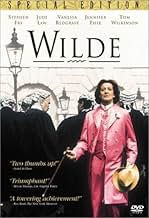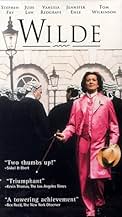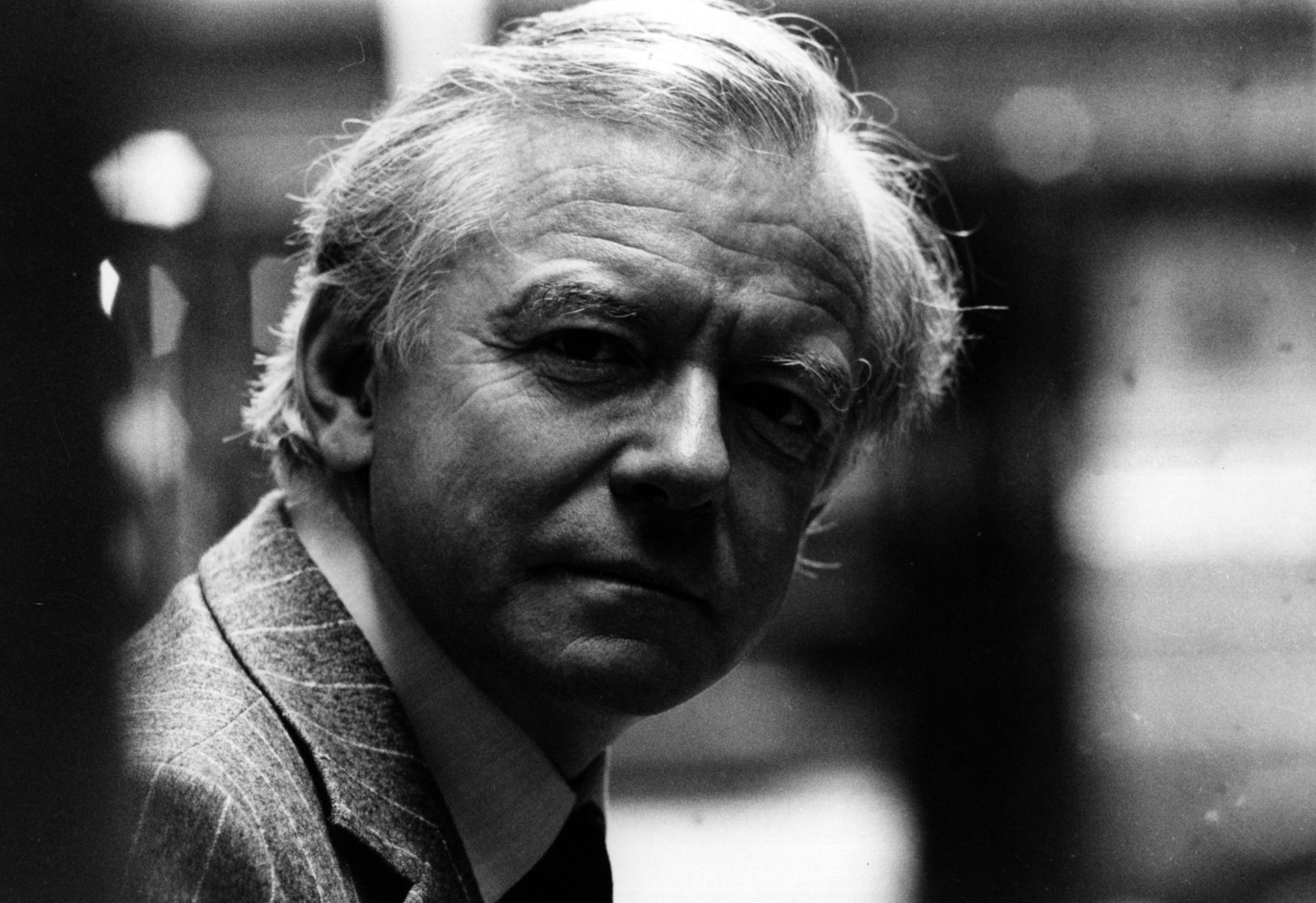NOTE IMDb
6,9/10
19 k
MA NOTE
La tourmente dans la vie du poète/dramaturge Oscar Wilde après la découverte de son homosexualité.La tourmente dans la vie du poète/dramaturge Oscar Wilde après la découverte de son homosexualité.La tourmente dans la vie du poète/dramaturge Oscar Wilde après la découverte de son homosexualité.
- Réalisation
- Scénario
- Casting principal
- Nomination aux 2 BAFTA Awards
- 4 victoires et 8 nominations au total
Jackson Ellis Leach
- Cyril Wilde, aged 4
- (as Jackson Leach)
Avis à la une
The mid-life years of (now genteel) decadent behavior by one of late Victorian England's celebrities, the Irish-born novelist-poet-playwright Oscar Wills Wilde (1854–1900). Director Brian Gilbert doesn't bandy about giving us the childhood torments of a literary genius; instead, he and screenwriter Julian Mitchell delve right into the more prominent chapters of Wilde's life, his marriage to a woman--producing two children--before realizing his homosexual desires, leading to some promiscuous indiscretions before finding love with churlish, childish poet Lord Alfred Douglas. Stephen Fry gives a masterful performance as Wilde, and the portrait allows for many shadings (this isn't a plea for the misunderstood gay artist, as Wilde himself is shown to be occasionally fickle, lusting, and selfish). Jude Law is equally good as ornery, demanding lover 'Bosie', whose tyrannical father brought about a court-case and two-year jail term for Wilde (covered previously in 1960's "The Man with the Green Carnation"), contributing to his early demise. A provoking, insightful, eloquent film--not at all stuffy or coy--which is due in large part to Gilbert's dexterous way with his actors and a keen sense of pacing and audience-involvement. *** from ****
I've seen Oscar Wilde portrayed on film before. I remember Robert Morley and also Peter Finch. They both provided inklings into the heart and mind of of one of the literary giants of the 19th Century. But one aspect of the tragedy, because, let's face it, it is a tragedy. His relationship with Alfred Douglas that in a very direct way, will mark his destiny. It was so difficult to believe that Peter Finch's Wilde will go to war for someone like John Frazer's Bosie. Good looking yes but devoid of the most important element, if you are going to believe in the power that Bosie had over Wilde. Finch and Frazer have the sexual chemistry of two slices of white bread but here, in this 1997 Wilde with Stephen Fry in the title role the mystery is revealed, Jude Law makes the whole thing totally believable. The desire he inspires we see in Oscar Wilde's eyes. Stephen Fry is another Humbert Humbert to Jude Law's Lolita. Amazing when the most incomprehensible action becomes totally understandable in the face of an actor. That alone, makes this Wilde my favorite.
This film biography of Oscar Wilde is a showcase for Stephen Fry. He not only looks like Wilde, he breaths life into the many passages from Wilde's writings that are woven into the screenplay. The difference between reading Wilde and experiencing Fry's performance is like reading Shakespeare and seeing Olivier perform. An evening listening to Fry read from Wilde's works would be worth paying a tidy sum to attend.
I had no idea that Wilde had married young to Constance Lloyd (Jennifer Ehle in a fine performance) and had two adorable boys by her. In an effective plot device, periodically throughout the movie Wilde reads to his sons from his children's story, "The Selfish Giant." The readings are presented in a way that cleverly integrates the storyline of the writing with the storyline of the movie, with Wilde being the selfish giant. And how many people know that Wilde wrote children's stories?
There are many examples given of Wilde's biting wit, such as, "Give a man a mask and he will tell you the truth," "The world is a stage, but the play is badly cast," and "I find that alcohol, taken in sufficient quantities, can bring about all the effects of drunkenness." Fry delivers these with perfect tone.
Of course a good part of the movie is devoted to Wilde's arrest and ultimate imprisonment for "indecent acts" with Lord Alfred Douglas (Jude Law). Wilde truly did live his life in accordance with his comment, "Where your life leads you, you must go. I defy society." As presented here, Wilde is a courageous and sensitive man who was forced into a tragedy by the strictures of a hidebound society. In current America most would judge his infractions with mild distaste at worst.
There are some disconcerting transitions, mostly in scenes with Lord Douglas. Douglas is seen to have a volatile personality. He could be needy and tender, but he could also be a first-class ass and manipulator with an explosive temper. His fits of anger seemed exaggerated and disrupted the tone of the movie. I had a similar reaction to the sex scenes in terms of disrupting the flow. Robbie's initial advances were abrupt and without foundation. The explicit sex scenes between Wilde and Lord Douglas would have been better hinted at than seen - their kisses and embraces could well be imagined but they felt incongruous and unbelievable in the flesh.
Wilde was much more than a wit. He could express emotions with eloquence. Consider this quote about encountering a previous lover after a hiatus of a few years:
"Life cheats us with shadows. We ask it for pleasure, it gives it to us with bitterness and disappointment in its train. And we find ourselves looking with dull heart of stone at the tresses of gold-flecked hair that we once had so wildly worshiped and so madly kissed."
The movie is nicely filmed with a good musical score. I wound up liking it more after having thought about it.
Watching this has expanded my appreciation for Wilde as a writer and as a person - I have been left wanting to know more about him and his work.
I had no idea that Wilde had married young to Constance Lloyd (Jennifer Ehle in a fine performance) and had two adorable boys by her. In an effective plot device, periodically throughout the movie Wilde reads to his sons from his children's story, "The Selfish Giant." The readings are presented in a way that cleverly integrates the storyline of the writing with the storyline of the movie, with Wilde being the selfish giant. And how many people know that Wilde wrote children's stories?
There are many examples given of Wilde's biting wit, such as, "Give a man a mask and he will tell you the truth," "The world is a stage, but the play is badly cast," and "I find that alcohol, taken in sufficient quantities, can bring about all the effects of drunkenness." Fry delivers these with perfect tone.
Of course a good part of the movie is devoted to Wilde's arrest and ultimate imprisonment for "indecent acts" with Lord Alfred Douglas (Jude Law). Wilde truly did live his life in accordance with his comment, "Where your life leads you, you must go. I defy society." As presented here, Wilde is a courageous and sensitive man who was forced into a tragedy by the strictures of a hidebound society. In current America most would judge his infractions with mild distaste at worst.
There are some disconcerting transitions, mostly in scenes with Lord Douglas. Douglas is seen to have a volatile personality. He could be needy and tender, but he could also be a first-class ass and manipulator with an explosive temper. His fits of anger seemed exaggerated and disrupted the tone of the movie. I had a similar reaction to the sex scenes in terms of disrupting the flow. Robbie's initial advances were abrupt and without foundation. The explicit sex scenes between Wilde and Lord Douglas would have been better hinted at than seen - their kisses and embraces could well be imagined but they felt incongruous and unbelievable in the flesh.
Wilde was much more than a wit. He could express emotions with eloquence. Consider this quote about encountering a previous lover after a hiatus of a few years:
"Life cheats us with shadows. We ask it for pleasure, it gives it to us with bitterness and disappointment in its train. And we find ourselves looking with dull heart of stone at the tresses of gold-flecked hair that we once had so wildly worshiped and so madly kissed."
The movie is nicely filmed with a good musical score. I wound up liking it more after having thought about it.
Watching this has expanded my appreciation for Wilde as a writer and as a person - I have been left wanting to know more about him and his work.
The acting in this film was superb. As had many viewers--I suspect-- I had only seen Stephen Fry in the Blackadder and Wodehouse series. How delightful to find another actor intelligent and flexible enough to range from Melchett to Oscar Wilde! One cannot help but watch his face very carefully, waiting to see the mask slip. He seems strangely delicate in his huge, crushing frame...A nice follow-up movie to Velvet Goldmine, especially once you know that some of the dialogue from the latter was lifted from the works of Oscar Wilde.
This film was one of the best to appear in the late 90s, and is a sensitive, involving, honest and moving biography of one of the greatest writers of the Victorian era, the infamous Oscar Wilde.
More realistic and better played than previous studies of the writer (Robert Morley and Peter Finch both played Wilde in the 1950s), this film benefits greatly from a cracking performance by Stephen Fry in the lead. Not even regarded as an actor, more of a comedian, prior to this, Fry (himself gay, and something of an intellectual) puts across all the nuances and contradictions of the subject perfectly.
This Wilde is torn between what is accepted love (his wife, and children), and the 'love that dare not speak its name' (primarily his destructive relationship with the needy, selfish and petulant Lord Alfred Douglas, played here by Jude Law in the role which brought him to world attention). We see his charm and conviction when creating his plays or amusing friends, we also see his weaker side and why he was the cause of his own eventual arrest and imprisonment, we see how prison changed him and - as he wrote himself in De Profundis - broke his spirit and his health.
Watch out for other, now big, names in the cast - Ioan Gruffudd, Michael Sheen, Orlando Bloom - alongside the established players such as Vanessa Redgrave (Oscar's mother, Sperenza), Jennifer Ehle (Lady Constance Wilde), Tom Wilkinson (Marquess of Queensbury, Bosie's father), Gemma Jones (Bosie's mother), and Judy Parfitt.
A fitting musical score, a smattering of Wilde's epigrams, and a large chunk of his children's story 'The Selfish Giant' (driving and commenting on the action at key points) leave this film close to perfection when detailing the story of the misunderstanding of another age, not too far back from our own.
More realistic and better played than previous studies of the writer (Robert Morley and Peter Finch both played Wilde in the 1950s), this film benefits greatly from a cracking performance by Stephen Fry in the lead. Not even regarded as an actor, more of a comedian, prior to this, Fry (himself gay, and something of an intellectual) puts across all the nuances and contradictions of the subject perfectly.
This Wilde is torn between what is accepted love (his wife, and children), and the 'love that dare not speak its name' (primarily his destructive relationship with the needy, selfish and petulant Lord Alfred Douglas, played here by Jude Law in the role which brought him to world attention). We see his charm and conviction when creating his plays or amusing friends, we also see his weaker side and why he was the cause of his own eventual arrest and imprisonment, we see how prison changed him and - as he wrote himself in De Profundis - broke his spirit and his health.
Watch out for other, now big, names in the cast - Ioan Gruffudd, Michael Sheen, Orlando Bloom - alongside the established players such as Vanessa Redgrave (Oscar's mother, Sperenza), Jennifer Ehle (Lady Constance Wilde), Tom Wilkinson (Marquess of Queensbury, Bosie's father), Gemma Jones (Bosie's mother), and Judy Parfitt.
A fitting musical score, a smattering of Wilde's epigrams, and a large chunk of his children's story 'The Selfish Giant' (driving and commenting on the action at key points) leave this film close to perfection when detailing the story of the misunderstanding of another age, not too far back from our own.
Le saviez-vous
- AnecdotesOrlando Bloom made his film debut in this film, with a brief appearance as a "Rentboy."
- GaffesWhen Oscar Wilde visits his wife's grave near Genoa, the headstone states "Wife of Oscar Wilde." It originally stated only "Constance Mary, daughter of Horace Lloyd, Q.C." and "Wife of Oscar Wilde" was not added until later.
- Citations
Oscar Wilde: [last lines]
Oscar Wilde: In this world there are only two tragedies. One is not getting what one wants. The other is getting it.
- Crédits fousThe credits are in the style of the black-ink drawings of Aubrey Beardsley (1872-1898), leading artist of the Aesthetic movement and colleague of Wilde for whom he illustrated the text of "Salome" in 1894. In the opening credits the pictures reflect the character being played or suggest the role in the production team.
- ConnexionsFeatured in Venice Report (1997)
- Bandes originalesAh, Leave me not to Mine Alone
from "The Pirates of Penzance"
Words and Music by W.S. Gilbert (as Gilbert) & Arthur Sullivan (as Sullivan)
Meilleurs choix
Connectez-vous pour évaluer et suivre la liste de favoris afin de recevoir des recommandations personnalisées
- How long is Wilde?Alimenté par Alexa
Détails
Box-office
- Budget
- 10 000 000 $US (estimé)
- Montant brut aux États-Unis et au Canada
- 2 158 775 $US
- Week-end de sortie aux États-Unis et au Canada
- 69 424 $US
- 3 mai 1998
- Montant brut mondial
- 2 158 775 $US
- Durée1 heure 58 minutes
- Mixage
- Rapport de forme
- 2.35 : 1
Contribuer à cette page
Suggérer une modification ou ajouter du contenu manquant

Lacune principale
By what name was Oscar Wilde (1997) officially released in India in English?
Répondre

